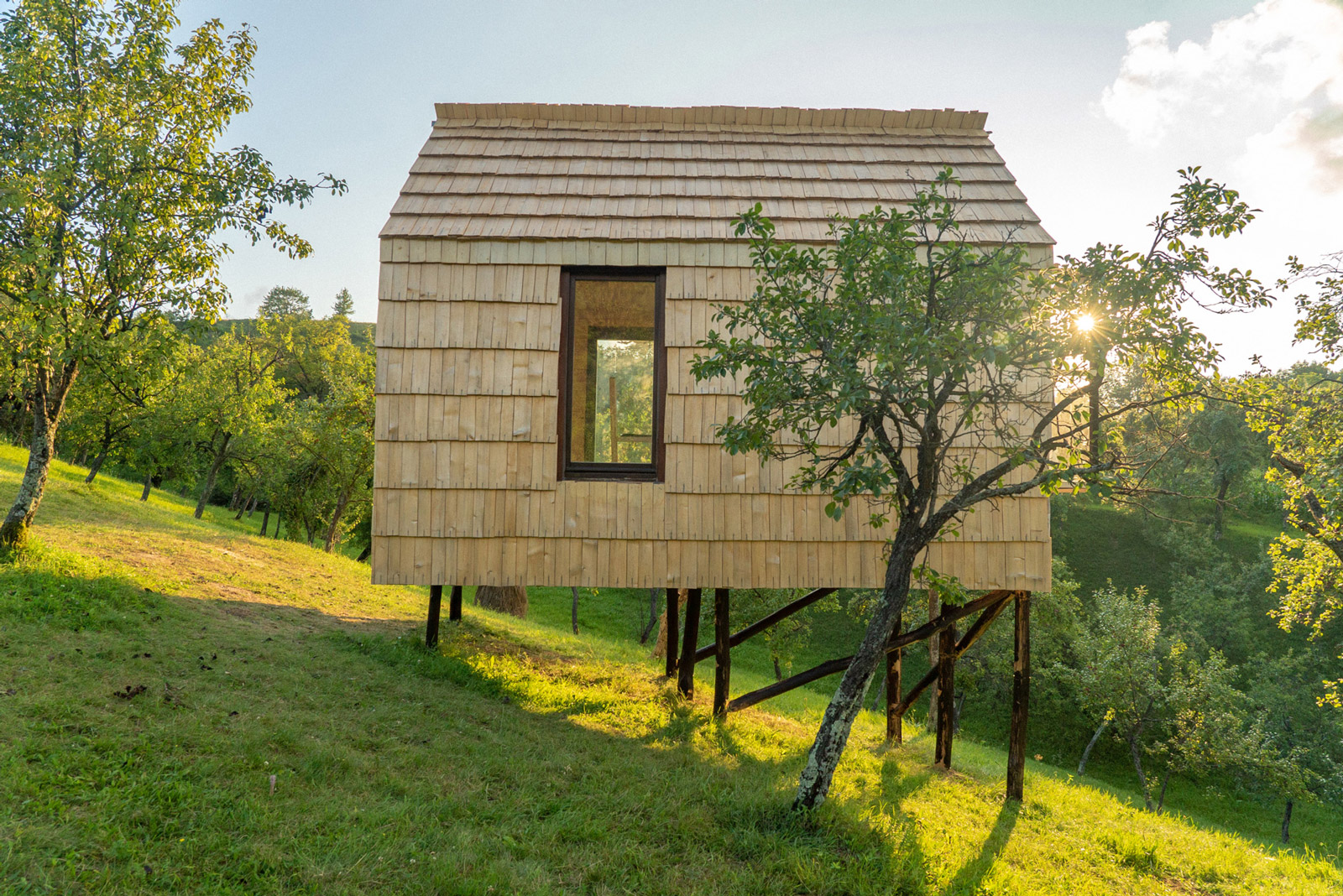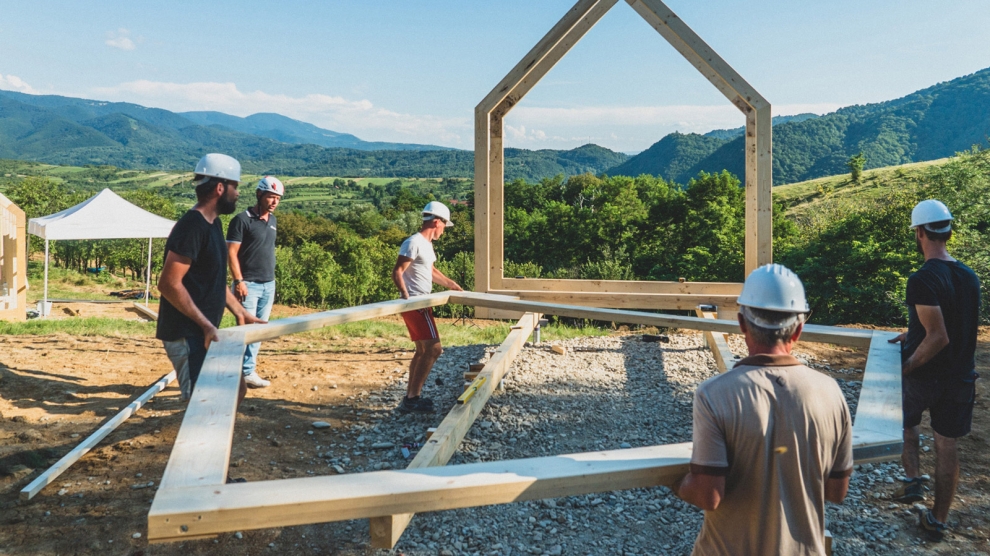Covid-19 has made remote work more popular – and indeed necessary – than ever. Across the globe, millions of people are eschewing their daily commute, instead setting up offices at home, in their sheds, or – on sunny days – their gardens.
In Romania, the World Wildlife Fund (WWF), together with the local community in the village of Armeniș and innovators in sustainable architecture, have taken things one step further. They have started work on the first urban-rural collaboration campus in the country, known as WeWilder. The centre aims to be a meeting place for freelancers, teams from companies, artists, entrepreneurs and local residents; forming a circular economy network located in the heart of nature.
“Our vision for WeWilder is to create an innovation centre for nature entrepreneurship,” says Orieta Hulea, CEO of WWF-Romania. “As a freelancer you can work from here, power up, eat well and in return lend a hand to create ideas and projects with a long-term vision. We offer companies an opportunity for their teams to experience a wilderness area where WWF conducts conservation projects. This place can be a great source of inspiration for sustainability and business innovation – a bridge that connects us. The WeWilder campus is a model. Once validated, the team’s intention is to learn, refine and multiply it in other priority conservation areas in the region.”
WeWilder is a prototype of Panda Labs, the global innovation platform of WWF-International. The project was developed in response to the need for the rural community to grow substantially and sustainably alongside the wildlife which surrounds it. With 100,000 US dollars in funding received from multinational electronics group Flex, based in Timișoara, WeWilder aims to be an example in terms of green architecture and a model for the implementation of a micro green economy which can echo throughout the region.
This year, the WeWilder campus will consist of three wooden cottages called chilii (hermitages); and a central space called zâna (the Fairy) which contains a co-working area, community kitchen and library. The campus has adapted to the current reality caused by the Covid-19 pandemic. The cottages have been designed as self-contained spaces with a kitchenette and laptop workspace so that one or two people can work without coming into contact with other people.

The space follows the philosophy of invisible architecture, the integration of buildings in nature both in appearance, materials and experience from the inside. The glass facades offer a panorama of the Tarcu Mountains and a spectacular view of the surrounding hills. The materials chosen for the construction follow the vision of sustainable development in the spirit of respecting nature, which would not have been possible without the expertise of the technical partners: Tukuma Works, Schweiz Technique, Rothoblaas, Welde, Festool and Saint-Gobain Glass. The buildings are constructed of legally-sourced wood, and the insulation is made from reused wood fibre.
The modular design made by a team of architects including Matius Ichim, Krisztina Bokos, Alexandru Blănaru, Miodrag Stoianov and urban planner Ioan Moldovan will enable the centre to evolve rapidly. The design team also includes Christof Krattiger, Zsolt Bogdan and Mihai Toader Pasti who contributed to the structural design by coming up with the technical solutions that make invisible architecture possible and blending the buildings into their surroundings.
WeWilder is located in a garden surrounded by trees. Later, the garden will be transformed by landscape architect Tiberiu Cherecheș into a corner of heaven highlighting local biodiversity. In addition to planting miniature maple and ash forests next to each house, there will be a mixed forest near the main building. WeWilder will also host a vegetable garden and a permaculture area, as well as a place dedicated to learning traditional grass cutting; a skill that is essential for maintaining grassland biodiversity.
The WeWilder campus is supported by a network of dwellings already renovated by villagers both in the village and in the middle of nature. These cottages are ready to receive guests. These houses number among them the MuMA Hut, a living experience in a local orchard which was nominated for an award this year at Beta – the architecture biennial in Timișoara.
“The concept of the place was sketched after workshops with the Design Thinking Society, experts and locals sitting at the same table,” says Oana Mondoc, WeWilder project manager and responsible person for innovation and community development at WWF-Romania at Bison Hillock. “The need to expand co-creation between various fields and layers of society and mobilise social entrepreneurship was stressed. The campus emerged as the most natural solution – a springboard for the development of a model community in the Southwestern Carpathians. WeWilder is a meeting place for urban people and the rural community where we can learn from each other. Here, we create new ideas that help us live closer to nature. We like to say it’s the place where we can reinvent the world.”
The entrepreneurial programmes were designed together with partners from Synerb Venture Catalizer. WeWilder aims to help local communities move from an economic model based on the use of natural resources as a raw material to one that emphasises the creation of added value to natural resources. The WeWilder team, together with its partners, has created several immersive programmes and experiences in nature. In addition to the most sought-after experience, tracking rewilded bison, guests can learn to create haystacks or rent bicycles or e-bikes, and choose from gastronomic workshops.
In addition, a number of locals already offer local dishes as part of the stay, or as culinary experiences in nature. Community cuisine will be an additional catalyst for the local economy. The locals will offer quality local ingredients which will be served during brunch, and organise culinary experiences for guests. Furthermore, the campus will encourage a “sharing economy” model for the WeWilder residences which will require specialists in various fields to provide knowledge to the community in exchange for a living experience. A vacation with a purpose.
Next year, after the completion of the first stage, WeWilder aims to add four more cottages to the campus. So far, in addition to Flex, a number of co-team partners with expertise or materials will join in to complete the total investment, amounting to over 200,000 euros.
Above all though, WeWilder should be seen as an ever-evolving project, and WWF is keen for others to join what it views as a benchmark initiative.
—
Photos: Razvan Dima / WWF-Romania
—
Unlike many news and information platforms, Emerging Europe is free to read, and always will be. There is no paywall here. We are independent, not affiliated with nor representing any political party or business organisation. We want the very best for emerging Europe, nothing more, nothing less. Your support will help us continue to spread the word about this amazing region.
You can contribute here. Thank you.


